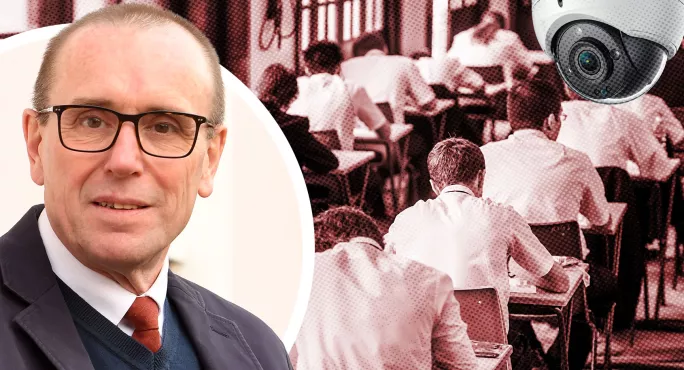
Use AI cameras to invigilate GCSEs, says exam board chief

The leader of England’s biggest exam board has backed a gradual move towards using artificial-intelligence cameras to invigilate GCSE and A-level exams, saying schools would see “enormous gains”.
In an exclusive interview withĚýTes, AQA chief executive Colin Hughes also said that digital exams may not be ready until 2028, and not for a major subject until at least 2035 - five years later than originally planned.
Mr Hughes said he believed thatĚýdigital invigilation - using an AI camera that flags suspicious behaviour to a human watching a screen remotely - is viable, and desired, for key stage 4 and key stage 5 exams in schools.
“We are now in a situation where we could install cameras that are watching people undertaking an exam and it will be more effective and more efficient and more reliable to have,” he said.
“The human [invigilator] has got their back turned as they’re walking up and down the hall. The camera never has its back turned.”
AI cameras for exam invigilation
The technology has the potential to bring an end to the traditional scene of invigilators pacing up and down the aisles of a packed exam hall.
Introduction of the technology for students sitting GCSEs, AS levels and A levels would, however, only be possible with approval from Ofqual.
Mr Hughes said that “remote proctoring”, more commonly known as digital invigilation, “has been going on for quite a long time” in other areas of education, such as vocational exams, thanks to advances in AI and eye-tracking technology.
In his view, the AI software will provide “enormous gains” and “hugely diminish…a lot of the bother for schools to recruit invigilators and make sure they’re well trained”.
Mr Hughes highlighted the difficulties that schools face in facilitating mass exam hall assessments because of a lack of space and the increasing need for access arrangements.
He said: “Do you need to have huge halls with 250 people? Do you need to have half a dozen invigilators when one could look at five rooms with 50 people in each of them?
“Right now the technology is already pretty much there to do that.”
Asked whether he could foresee this happening in the not-too-distant future, Mr Hughes said: “I’m pretty confident about it.”
Nonetheless, he noted that the “radical posture” of digital invigilation allowing students to take high-stakes exams at home rather than in school wasĚý“quite a way off”.
Ěý
Mr Hughes also told Tes thatĚýAQA expects to see “white smoke” from Ofqual in approving its first set of three digital exams this autumn, but rollout may not be until 2028 - two years after originally planned.
The exam board is now also seeking approval for one small-subject-size A level to be assessed digitally in addition to its proposals for the reading and listening components of its GCSE Italian and Polish courses, which it had previously hoped to run in summer 2026.
The original plans wereĚýdelayed last year, which AQA said was due to needing more time to engage with the sector and Ofqual, and because of the general election.
Mr Hughes said: “We are technologically, administratively, process-wise, ready to deliver digital exams...we are just now waiting for that white smoke to come up and I expect to see that white smoke sometime around the autumn.
“In principle, we could deliver the first fully digital exam components in the summer of 2027, but it could be 2028.”
He noted that the government’s review of curriculum and assessment has also delayed matters, adding that Ofqual was taking its time on regulatory approval with “very good reason” because it is a publicly and politically sensitive area.
Long wait for digital exams in major subjects
Mr Hughes cautioned that the rollout of digital exams would be gradual, with digital exams for mass-enrolment subjects like GCSE English language at least “a decade away” - a significant delay on aĚýpreviousĚýaspiration to roll this out by 2030.
Mr Hughes said “the sheer practicalities of delivering at scale, we’re not there yet”, highlighting that many schools simply do not have the space to deliver large-scale digital exams nor any experience with them yet.
Regarding concerns over exam security and the possible hacking of servers holding digital exam papers, he added that “all of the risks exist anyway…[and] just become different”.
“Right now all the storage is already digital. The bit that’s different is I move an awful lot of paper to you and then I move an awful lot of paper back to me [and] there’s quite a lot of security requirement there,” he said.
For the latest education news and analysis delivered every weekday morning, sign up for the Tes Daily newsletter
You need a Tes subscription to read this article
Subscribe now to read this article and get other subscriber-only content:
- Unlimited access to all Tes magazine content
- Exclusive subscriber-only stories
- Award-winning email newsletters
- Unlimited access to all Tes magazine content
- Exclusive subscriber-only stories
- Award-winning email newsletters
You need a subscription to read this article
Subscribe now to read this article and get other subscriber-only content, including:
- Unlimited access to all Tes magazine content
- Exclusive subscriber-only stories
- Award-winning email newsletters
- Unlimited access to all Tes magazine content
- Exclusive subscriber-only stories
- Award-winning email newsletters
topics in this article



